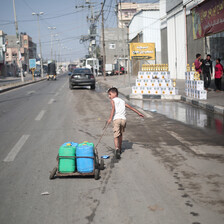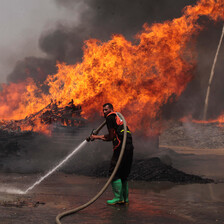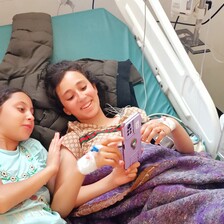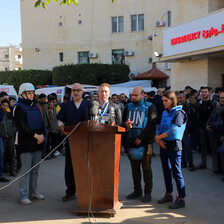The Electronic Intifada 27 October 2023
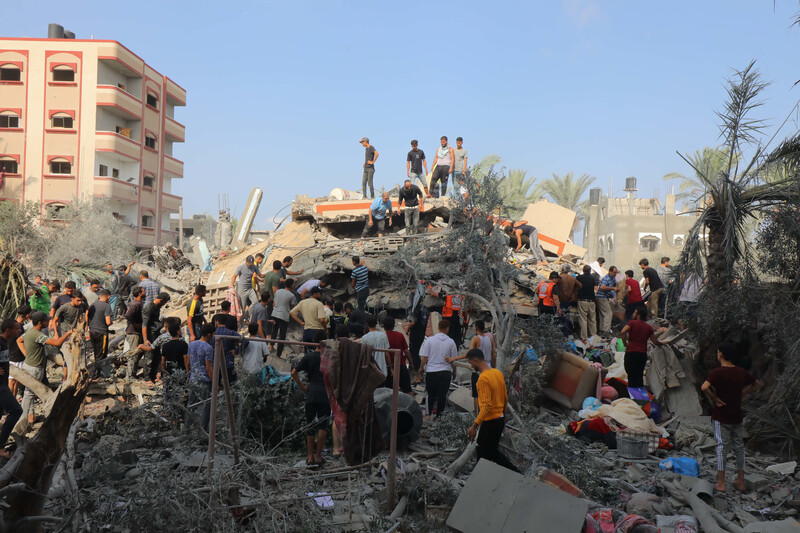
The Deir al-Balah area of Gaza has been bombed repeatedly by Israel this month.
APA imagesMid-October 2023
Last night was extremely worrying.
My extended family huddled in one room, seeking safety in togetherness. We kept checking on each other, making sure that all my nieces and nephews were accounted for.
My father kept a watchful eye on everyone.
For the third day in a row, the electricity was out. When a neighbor knocked on our door during the hours of darkness, I was the one who opened it.
Our neighbor requested that my brother – who works as a nurse – give him an injection.
I had to tell him that my brother wasn’t here. Since the war began he has been working constantly.
I am scared for my brother’s safety. Israel has already killed a number of medics.
The thought that we may have to evacuate our home never crossed my mind until Israel launched a major attack against Gaza in 2014. An order was issued then that everyone living within 3 km of Gaza’s boundary with Israel must leave their homes.
That is the only time we have had to evacuate. If we have to evacuate now in October 2023, we are not sure where we could go.
Evacuation bags
Nevertheless, everyone has their evacuation bags prepared.
An evacuation bag has become a fixture in every Palestinian home. It includes our ID cards, passports, contracts, leases and other official papers.
My niece has insisted on putting a trophy from the organization Amideast in her bag. She won it in an essay-writing competition.
We chuckled when we heard it was in her bag. But the trophy is something precious to her, something she does not want to lose.
My friend Dalia is a mother of four. She had to flee her home in Al-Karama, an area in northern Gaza.
Dalia sought shelter in Al-Rimal, a neighborhood of Gaza City. Yet when Israel’s violence reached al-Rimal, she had to move again, this time to a relative’s home in Jabaliya refugee camp.
Then – after Israel ordered more than 1 million people to evacuate northern Gaza, including Gaza City – Dalia moved southwards to Deir al-Balah.
Dalia vividly described how harrowing the experience was. “We heard the missiles whistling as they descended,” she said. “Then the sounds of explosions. This was repeated countless times throughout the night. We can smell the gunpowder.”
It is distressing to think of Israel’s missiles getting closer and closer to our bodies.
My brother-in-law works as a surgeon in a hospital in Rafah, Gaza’s southernmost city.
“The hospital has already received numerous dead bodies,” he said. “The injuries on them were severe. We are just preparing them for the funerals. It was heartbreaking to see that they were children.”
Since 7 October, my brother-in-law and his colleagues have been working around the clock. The hospital has a shortage of staff.
My brother-in-law has never witnessed a scenario as dreadful before.
“The situation is deteriorating,” he said. “The lack of electricity and disruptions to the internet are making things worse.”
At the beginning, having internet access allowed health workers to stay informed about the overall situation in Gaza and to coordinate efforts. That has become increasingly difficult.
Shaken
We have all been shaken by Israel’s bombs. One bombardment was so devastating that I felt as if my heart left my body before coming back.
We have devised a strategy to try and protect each other. It involves covering our backs, so that any shattered glass or falling debris would strike our backs instead of our faces.
My second eldest brother has kidney problems. He needs to receive dialysis but has difficulty accessing the hospital.
Normally, my brother spends four hours on the dialysis machine. “But they have reduced the session to only three hours,” he said.
When he went to the hospital, everything felt rushed. After dialysis, he is normally given iron, bandages and certain medicines. This time, he was not given any of these things.
Night is yet to come.
A short while ago, a missile flattened one of the houses in Deir al-Balah without prior warning. I could hear the missile.
We have heard that 14 people were killed in the airstrike on Deir al-Balah. It is devastating to think this happened so suddenly.
Among the victims was my neighbor’s wife. She had believed that moving to the central part of the city would be safer than being in the east (where we live).
Everywhere is unsafe
Unfortunately, she did not know that the central part is also unsafe. Everywhere is unsafe.
My sister has called me to say that one of her students has been killed. Her name was Rouh.
According to my sister, Rouh was exceptional in everything she did. She was particularly good at learning languages.
Rouh means “soul.” Her father named her Rouh because he believed she was the essence of his soul.
Many of my friends have reached out to me – especially those with whom I studied for my master’s degree in the US. I’m not sure what I should tell them.
Should I tell them there is a genocide going on? Should I mention the numerous massacres taking place?
Should I start with the Nakba – the 1948 ethnic cleansing of Palestine? Or with the occupation of Gaza and the West Bank that began in 1967?
Should I tell them about massacres that took place in 2008, 2012, 2014, 2021 and 2022? Or the massacre of yesterday?
Should I urge them to take to the streets and protest against Joe Biden and the West’s unwavering support for the Israeli occupation?
Why is it necessary to continuously educate Americans about the situation? Haven’t they learned enough?
Do they not have enough knowledge to discern right from wrong?
I feel ashamed. I only use the word “genocide” when responding to one person.
Haunted
My nieces and nephews are gathered around. And I am holding my 10-month-old niece in my arms.
She is so young and innocent.
I have just seen a video of another child the same age who has been killed. Her father held her in his arms as they ran.
The image haunts me.
I hold my nieces even closer to my heart and pray for their safety.
My oldest nieces have begun sharing their wishes.
Reema wants an end to the war and a return to normal life.
Maria dreams of building a school where no teacher would ever yell at students.
Sara wants to study computer engineering at the Massachusetts Institute of Technology.
Raghad yearns to leave Gaza.
My sister-in-law has a wish, too: a stable job for her husband.
Our chat about wishes and hopes comes to an abrupt halt. An airstrike shakes the house. The sound is deafening.
The subject of conversation changes.
One niece speaks about her friend. Members of her friend’s family have been killed. We talk about whether it is possible to offer condolences to her friend.
Another niece remarks somberly: “There will be a lot of funerals. The streets of Gaza will be filled with funeral processions.”
Night falls. More airstrikes ensue.
We have heard that Israel plans to physically separate the northern part of Gaza from the southern region. The news has a marked effect on my aunt.
In 1948, Zionist troops forced her family to leave her ancestral village Beit Daras. She was only 6 months old.
My aunt sees what Israel is planning now as another Nakba. Another catastrophe inflicted on the Palestinian people.
It is disheartening to see Israel employing similar tactics now to those used in the Nakba.
Israel is playing with the mental wellbeing of Gaza’s residents in an attempt to coerce them into fleeing their homes. Many of those homes have already been damaged or destroyed.
These tactics not only create fear and uncertainty. They disrupt the social fabric of Gaza.
By physically dividing the territory, Israel is worsening the already dire situation in Gaza. The impact on the mental health of Gaza’s people cannot be overlooked.
The constant stress, anxiety and trauma inflicted by such measures takes a toll on both individuals and families. It is a deliberate strategy, designed to weaken the spirit and the resilience of the Palestinian people.
Ghada Al-Haddad is a journalist based in Gaza.
